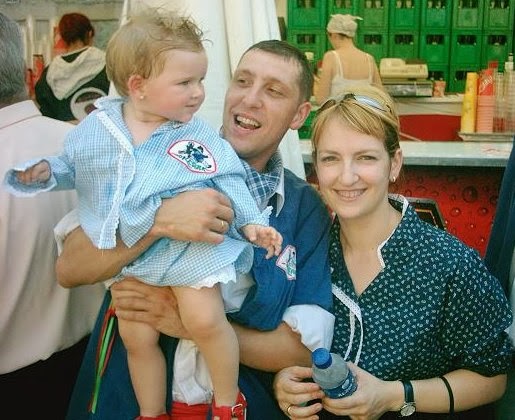It's common to think of "dark" traits as non-European, and "light" traits as Nordic or Germanic, but the Basque population of Southwestern Europe completely shatters this notion. Basques are a pre-Indo-European, Paleolithic relic from Iberia who've remained isolated and genetically unaltered for millennia, yet they exhibit the full spectrum of European phenotypes, from the "mixed-looking" to the "Aryan-looking." Being Mediterranean and Dinaric subracially, on average they closely resemble Spaniards, Italians, Greeks and other Southern Europeans.
Anthropology
"The Basques are basically Mediterranean (in the wider sense) racially, with some brachycephalic accretion. This accretion is for the most part Dinaric and only to a minor extent directly Alpine. Morphologically the Basque crania show many resemblances to those of Serbo-Croats and of some South Germans. Collignon's comparison between French Basques and the southwestern French makes this distinction clear. The Basques, through inbreeding, ethnic solidarity, and the possession of a recognized national ideal type, have developed a characteristic physiognomy, the essential features of which are nasal prominence and a narrowness of the median sagittal facial segment, and of the mandible."
GeneticsIn a study of European Y-chromosome (paternal) diversity, Basques were found to belong entirely to Paleolithic-European haplogroups 1, 2 and 22. No Neolithic lineages from the Middle East (HG9) or North Africa (HG21) were detected in the sample (though other studies have found them at very low levels), nor were any more recent markers from sub-Saharan Africa (HG8) or Central Asia (HG12/16). [Note that these five haplogroups exist at varying frequencies in other European populations.]* * *A study on European founder lineages reveals that Basques also have the highest Paleolithic mtDNA (maternal) component in Europe, with 85.4% of their lineages belonging to old European haplogroups H and V. TheirNeolithic input is only 6.7% (Northern Europe has between 12% and 22%); their Bronze Age input, at 5.4%, is lower than Scandinavians' (7.4%); and they have "erratics" at a rate of 2.6%, though these represent rare European haplogroups, not African or Asian admixture.* * *"To assess the genetic position of Basques in a broader geographic context, we conducted phylogenetic analyses based on FST genetic distances using data compiled in previous publications. The genetic profile of the Basque groups revealed distinctive regional partitioning of short tandem repeat (STR) diversity. Consistent with the above, native Basques clearly segregated from other populations from Europe (including Spain), North Africa, and the Middle East."
Guipúzcoa (Spain)
Basses-Pyrénées (France)
Inner Pyrenees (France)
* * *
These two traditional Basque families nicely illustrate the extremes in the range of indigenous Southern European phenotypes:









